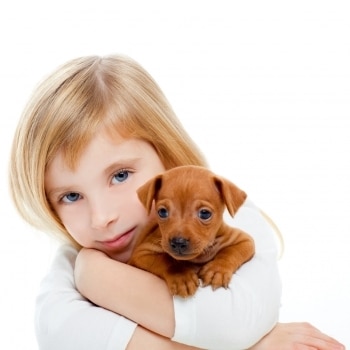Research on the relationship between pets and children clearly showed the positive impact of animals on the psychosocial development of youngsters. Self-confidence of children who grow up in families that have a pet is greater. Since animals seek unconditional love and require constant attention and care, the child develops a sense of responsibility. Pets provide children with a sense of confidence and security, a sense of independence and initiative, desire to explore their environment, patience, self-restraint and diligence. It was also found that children with pets achieve better success in school and record better grades on tests of compassion, self-esteem and self-knowledge than kids without pets.
Get children and animals acquainted
Almost all children are happy when they see their pets. They want to cuddle and play with them. However, a bad first encounter can cause trauma in children. From an early age children should learn how to properly treat pets, especially dogs, and vice versa. Dogs understand that children who are smaller than adults, are not pack leaders, so they could try to establish their dominance over them. This could lead to biting and growling at kids. Special attention should be paid to how children behave towards pets. Parents shouldn’t allow them to pull the dog’s tail, to ride them, squeeze and hit them because dogs are not stuffed toys. Moreover, children should be explained that not all pets are the same, and friendly.

- Never leave your child and dog alone until the child is big enough to understand all the rules related to social behavior of dogs.
- Put the dog on a leash and let a child come to it, but don’t let the child look directly into dog’s eyes. If the child looks at the dog, and not at parent, the dog will feel threatened because this is perceived as aggressive behavior.
- Allow the child to stroke the dog, but emphasize that cuddling the dog’s head is not good for now.
- Praise the dog for good behavior, if it deserves, or reprimand it, if it tried to bite a child or if it snarled for no reason.
- Teach the children that dogs should never be disturbed when they eat, nor should they touch the dog’s bowls and toys.
Dog care
In today’s world everyone is always in a hurry so there’s little time to spend with children, and even less time to care for the pet. It is necessary to make a list containing the entire needs of a dog, and this may be given to children to follow. In this way, they take part in the care of pets. Initially, they can only change the water, later, feeding can become their task, and in the end they can even be entrusted with walking the dog.
Dogs should always have proper hygiene and diet. No matter how little time there is, dogs should always be properly brushed with furminators and bathed with specialized shampoos. Proper, healthy and good nutrition are essential for longevity, good health, proper growth and development, the quality of hair and general satisfaction of the pet. Therefore, it is the owner’s task to ensure a diet that has optimum amount of vitamins, minerals, protein, carbohydrates, protein, fat and all the other essential nutrients, which all could be found at your nearest pet store.
Baby and the dog
When it comes to babies, dogs are curious, so if the baby just arrived home, it would be best to ask a friend or relative for help with getting to know a dog with a baby. Babies are very active, they wave their arms and legs, and their cries can startle the dog. During this period it is essential that the dog gets used to everything. Let the dog see and sniff the baby, but it shouldn’t touch the child. If the dog is well behaved towards the child, it should be praised and rewarded. Playing with the dog in the same room where the baby is would be good, because then the dog would realize that it won’t be loved any less than before.
The child and the dog can give a lot to one another. Dogs respond to cuddling with joy, and above all they are persistent and always ready to play. At the same time, they have educational influence on a child, and help to develop a sense of responsibility. The child and his canine friend learn from one another, because they are mutually equal. Experts say that children who have lived with a dog behave more naturally when they grow up. These children are not nervous and do not fall into the extremes, they are independent, not too loud, and their psychological development is stable and without stress.




